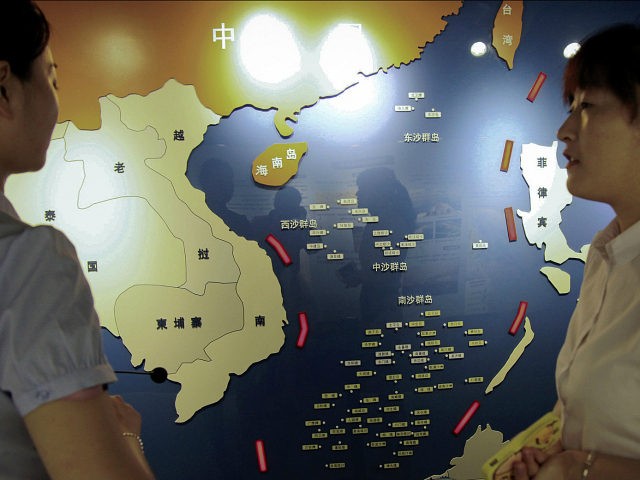China’s Vice Foreign Minister Liu Zhenmin told reporters Wednesday that the nation has “the right” to establish an Air Defense Identification Zone (ADIZ) over the South China Sea following the rejection of Chinese territorial claims in the region by the Hague.
The Permanent Court of Arbitration at the Hague issued a verdict Tuesday in the case Philippines vs. China, siding with the Philippines on all counts and rejecting Chinese claims that almost the entire sea “historically” belongs to Beijing. China’s claims overlap with the sovereign territory of the Philippines, Vietnam, Malaysia, Brunei, and Taiwan and overlaps with exclusive waters under Indonesian control.
Liu told reporters that Beijing is considering establishing an ADIZ over the region it claims, which would require all aircraft entering the zone to identify itself to Beijing before passing through. Such a move would require the nations whose territory is affected to force its aircraft to identify itself to a foreign country before flying through domestic air or face military force from China.
“If our security is being threatened, of course we have the right to demarcate a zone. This would depend on our overall assessment,” he asserted. He referred to the rumors of a zone as a foreign “invention,” however.
“China’s aim is to turn the South China Sea into a sea of peace, friendship and cooperation,” he alleged, an aim allegedly thwarted by the “piece of waste paper” decision from the Hague. He also accused Shunji Yanai, a former president of the International Tribunal on the Law of the Sea, of having “manipulated” the decision, despite not serving on the tribunal for two years and the tribunal not having any influence over the Permanent Court of Arbitration. Liu claimed Yanai’s Japanese background was to blame, though Japan has no territorial claims in the South China Sea.
Rumors of a potential establishment of an ADIZ in the area have been circulating since the international court announced July 12 as the date for the release of their verdict. In June, the South China Morning Post warned that Beijing may use the presence of U.S. Navy ships in the region as an excuse to establish the zone, though it is legal for such navy ships to pass through the sea.
The Chinese government has experimented with establishing zones like these in the past. In 2013, Beijing announced that it was setting an ADIZ over the Japanese Senkaku Islands in the East China Sea, which China claims as its own and calls the Diaoyu. The islands are uninhabitable but home to rich resources and geographically desirable. Both the governments of Japan and the United States have disregarded the ADIZ, with President Obama asserting to Beijing that any military retribution against a Japanese aircraft that does not identify itself would require the U.S. military to attack China as per post-World War II treaties with Japan. China has not attempted to enforce this ADIZ since.
An ADIZ over the South China Sea would compromise the sovereignty of six countries rather than just one: The Philippines, Brunei, Taiwan, Vietnam, Malaysia, and Indonesia. And the U.S. does not have similar military treaties with all of them. Taiwan has already asserted it would fully disregard an ADIZ over its territory.
The Chinese government continued its propaganda campaign against the Hague on Wednesday, releasing an extensive “white paper” arguing the case for its “historical” sovereignty over most of the sea. The paper calls the Philippines’s case “remotely relevant and woefully weak” and demands of the new government in Manila bilateral talks that override the Hague court victory. “China has conducted consultations with the Philippines on managing maritime differences and promoting practical maritime cooperation, and the two sides have reached important consensus on settling through negotiation relevant disputes in the South China Sea and properly managing relevant disputes,” the paper claimed.

COMMENTS
Please let us know if you're having issues with commenting.